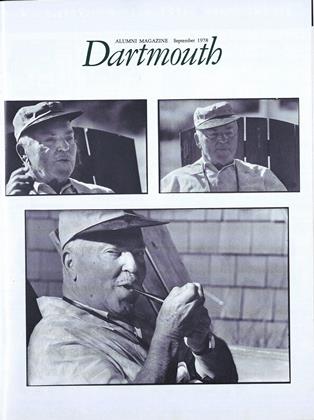Notes on a launching: a new journal, not for the literati alone, but for the literate, one and all.
September 1978 R. H. R.Notes on a launching: a new journal, not for the literati alone, but for the literate, one and all. R. H. R. September 1978
IT'S not every day, in our video-saturated society, that a new literary journal is launched. There hasn't been a major one in New England for perhaps 50 years. The times are out of joint for new ventures in the printed word, so they say.
Yet just such an enterprise is a-borning now in an editorial office on the third floor of the Aldrich House in Norwich. In late September volume I, number 1, of the New EnglandQuarterly will slide down the editorial ways into subscribers' mailboxes and the nation's bookstores.
Devoted to publishing creative literature in all its forms - poetry, fiction, drama, essay - New England Quarterly is the handiwork stem to stern of two assistant professors of English at the College, Sydney Lea and Jay Parini. No spur-of-the-moment venture, it is the carefully constructed culmination of months and years of imaginative planning and intensive work. It is, the editors hope, built to last.
The basic design was conceived in Lea's and Parini's imaginations, the blueprints drawn from out of their literary taste and aesthetic judgment. Both are published poets; both have taught modern poetry and have worked in the creative writing program at the College, Lea for eight years, Parini for three. The practical demands of the publication marketplace have also required the sharpening of their skills in less esoteric areas, such as canvassing hundreds of potential contributors, setting up a prepublication campaign, and - of course! fundraising.
In spite of the implication of regionalism in its title, New England Quarterly will be national in scope, promise Lea and Parini. It will publish good writing from whatever quarter it may come. Of course, Parini says, "We are after all in New England, and all other things being equal we would probably give the nod to a New England writer." But "having a strong interest in New England," Lea adds, "doesn't mean that we are going to be regional." More important by far, both editors agree, is their policy of championing new writers. In New England Quarterly, they stress, tomorrow's good writers will get their chance today.
But the journal will publish large numbers of established writers as well. Early issues will contain selections from the last poems of Nobel laureate Pablo Neruda, published for the first time in English and translated by Alastair Reid; poetry by Richard Eberhart, Robert Pack, and Seamus Heaney; fiction by Jorge Luis Borges; critical pieces by Rene Wellek and Anthony Hecht; and an interview (the first in a projected series) with Eleanor Clark and Robert Penn Warren. Taken all in all, the editors estimate, about three-quarters of their pieces will be creative literature, one-quarter critical pieces about literature.
New England Quarterly has no connection, official or financial, with Dartmouth College. Though it can, as Parini says, "draw upon the pool of literary talent and interest at the College, the official connection is nil." Nor does the journal have at the moment any financial grants from foundations, public or private. The quality of their product, the editors hope, will attract some grant money in the future, but the funds required to get the project moving in the first place have come from the editors' own pockets and from a successful fund-raising effort among private sources.
Lee and Parini have aimed high. They have leased editorial offices and hired a managing editor, M. Robin Barone '78, editor of the women's journal Open Forum while an undergraduate; their format has been designed by a professional designer; the journal will be printed on fine paper and bound; their pay scale for accepted work is competitive with the two or three top literary journals in the country. "We are going first class," says Parini, "we'll give it our best try."
And why not! Lea and Parini have a lot going for them: experience, literary, judgment, a capacity for work. But most of all breadth. Narrow literary specialists they are not. "We want to appeal not just to literary people" they say, "but to literate people everywhere." If the deed matches the aim New England Quarterly's September launching will make some waves.
(Subscriptions are $10.00 per year and may be obtained by writing the editors at Box 170, Hanover, NH 03755.)
 View Full Issue
View Full Issue
More From This Issue
-
 Feature
FeatureA Company of Stretchers
September 1978 By Cay Wieboldt -
 Feature
FeaturePoet at Full Ahead
September 1978 By Charles G. Bolte -
 Feature
FeatureTHE RIVER and THE DAMS
September 1978 -
 Article
ArticleA Journey: Five days to Big Rapids
September 1978 By Dan Nelson -
 Article
ArticleDickey-Lincoln: Who wants it? Who needs it?
September 1978 By Greg Hines -
 Article
Article'A Spirit of Fire and Air'
September 1978 By NARDI REEDER CAMPION
R. H. R.
-
 Books
BooksTight Little Murder
December 1978 By R. H. R. -
 Books
BooksNotes on Mr. Eliot's Algonquian Bible, a Birthday Gift for Mr. Baker's Library
December 1978 By R. H. R. -
 Books
BooksLooking Back
April 1979 By R. H. R. -
 Books
BooksPoetic Institution
October 1980 By R. H. R. -
 Books
BooksIntolerable Ambiguity
November 1980 By R. H. R. -
 Books
BooksWhat If?
June 1981 By R. H. R.
Books
-
 Books
BooksFACULTY PUBLICATIONS
November, 1924 -
 Books
BooksGreat Escapes
MARCH | APRIL 2021 -
 Books
BooksNO SUBSTITUTE FOR VICTORY.
DECEMBER 1962 By CHARLES B. McLANE '41 -
 Books
BooksA FURTHER RANGE
October 1936 By Francis Lane Childs '06 -
 Books
BooksOLIVER GOLDSMITH.
February 1958 By JOHN HURD '21 -
 Books
BooksMILITARY POLICY AND ECONOMIC AID.
December 1961 By LAURENCE J. RADWAY


